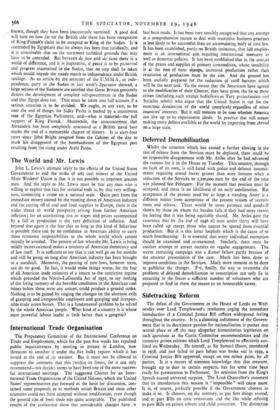International Trade Organisation
The Preparatory Committee of the International Conference on Trade and Employment, which for the past five weeks has repulsed public inquisitiveness by meeting in private in London, now threatens to smother it under the five bulky reports which it has issued at the end of its sessions. But it must not be allowed to suppress the comment that this (within its limits, for it can only recommend—not decide) seems to have been one of the more success- ful international meetings. The suggested Charter for an Inter- national Trade Organisation of the United Nations, which the United States' representatives put forward as the basis for discussion, con- tained some proposals as to methods which Britain and most other countries could not have accepted without modification, even though the general aim of freer trade was quite acceptable. The published results of the conference show that considerable changes have fact been made. It has been very sensibly recognised that any attempt at a comprehensive statute to deal with restrictive business practices is less likely to be successful than an accumulating body of case law. It has been established, partly on British insistence, that full employ- ment is an international aim requiring international measures as well as domestic policies. It has been established that in the control of the prices and supplies of primary commodities, whose instability is at the root of most slumps, increased production rather than restriction of production must be the aim. And the ground has been usefully prepared for the reduction of tariff barriers which will be the next task. To the extent that the Americans have agreed to the modification of their Charter, they have given the lie to those critics (including such strange bedfellows as Tory protectionists and Socialist rebels) who argue that the United States is out for the economic domination of the world completely regardless of other countries' interests. But it still remains to be seen whether America can live up to its expansionist ideals. In practice that still means making more dollars available to the world by importing from abroad on a large scale.


































 Previous page
Previous page